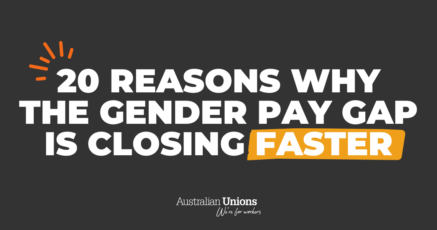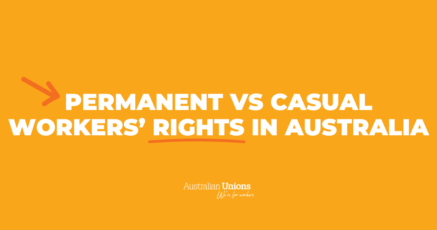Update: 8 May 2022
The Australian union movement revised its Annual Wage Review claim from 5% to 5.5% to ensure that the quarter of the workforce who rely on pay increases provided by the Review do not go backwards in the midst of the Morrison Government’s accelerating cost of living crisis.
A pay rise of 5.5% for the one in four workers who rely on the outcome of Annual Wage Review for wage growth aims to ensure that they do not go backwards in real terms.
Right now, the Fair Work Commission is reviewing a potential rise to the minimum wage.
Unions are arguing for a 5.5% pay increase that would impact the lives of 3 million workers across Australia.
But during this process, we have been hearing a lot of old disproven excuses from big business and media commentators about why the minimum wage shouldn’t be increased.
Not only are these deeply unfair to minimum wage workers doing it tough in the face of rising cost of living pressures, but they are simply incorrect.
So, if you find yourself dealing with any of these myths, here are five things you can say to set the conversation back on track.
Myth#1: Raising the minimum wage will cost jobs
Increasing the minimum wage means three things happen:
- Low-paid workers have more money to spend
- Minimum award workers spend the majority of their income in their local communities, with local businesses on things like groceries, rent, fuel and childcare. They spend all they earn.
- When low-paid workers spend in their local economy, their spending helps create more jobs.
There’s no evidence that raising the minimum wage costs jobs. In fact, the 2021 Nobel Prize in Economic Sciences was awarded to three economists who put that thinking to bed.
Myth#2: Employers can’t afford the increase
If profits are burgers, then big business is churning out more than Maccas. They had their profits go up 13% in 2021.
Despite the pandemic, our entire economy grew by 4.2%.
Profits went up, executives still got their bonuses, but workers’ wages didn’t increase.
Wages are actually at their lowest as a proportion of Australia’s national income since records began.
Meanwhile, all of the economic indicators for business health – like business survival and bankruptcy rates – say they’re in the best position they’ve been in a decade.
What’s more, the Tax Office revealed that a third of big businesses – like Qantas, News Corp and oil giant Chevron don’t pay a single cent of tax.
So employers can definitely afford to pay an increase in the minimum wage.
Myth#3: Pay rises will wreck the economy
Isn’t it convenient that no matter how the economy is performing, some big businesses and politicians always say that workers can’t have a wage increase?
Rain, hail or shine, they always say workers shouldn’t get a pay rise.
And yet we never hear the same argument for executive bonuses or massive profits for big business.
When the economy is performing well, it’s because workers are more productive and deserve a greater share of the wealth they create. And guess what – that’s the situation right now.
Wage increases help stimulate the economy. So, in bad economic times, a minimum wage increase can help boost the economy and create jobs.
Myth#4: Increasing minimum wages will increase inflation
Inflation is another bogeyman that the big business lobby tries to use to scare people into not supporting pay rises.
Inflation in the past year has been driven by supply chain pressures, corporate price-gouging, relentless rental increases and volatility in global markets for goods like oil and gas.
Denying underpaid workers’ a fair pay increase will do nothing to address these issues.
Wage increases that meet inflation and productivity growth do not add to inflationary pressures.
But don’t just take our word for it. That’s also what our head of Treasury and our head of the Reserve Bank have said.
Myth#5: Australia has a high minimum wage
Australia’s minimum wage used to be the best in the world. When unions created the minimum wage, it was a living wage – which means it was set at a rate that allowed a worker to support a family.
But since 2002, other countries have increased their minimum wage whereas ours has slipped backwards. We are now ranked just number 12 in the developed world.
And our minimum wage is now $127 dollars a week below the poverty line.
So, if big business say Australians are too well paid, they are only talking about their own executive bonuses.
We cannot ignore the fact that Australia has some of the highest costs of living, highest corporate profits in the world and some of the highest worker productivity in the world.
We are one of the richest countries in the world. But over the past nine or so years, household poverty has worsened significantly, and the number of people who work full time but live in poverty is now at record high.
It’s time for a 5.5% increase to the minimum wage
Morrison could be working with unions to create wage growth and more secure jobs. He could ask the Fair Work Commission to give low paid workers a proper pay rise. But instead he is keeping workers in poverty.
A minimum wage should serve as a living wage, allowing workers to enjoy decent leaving standards.
Union members have been making sure that no worker is left behind, even in the face of Morrison Government inaction.
Workers in Australian unions continue to negotiate higher pay in ways that ensure all members get a fair wage for a fair day’s work.






SHARE:
Ready to support a 5.5% wage increase but not sure how? Here’s five things you can say